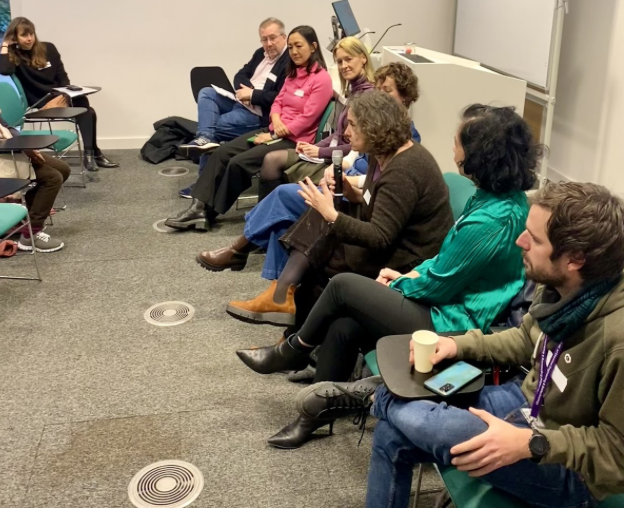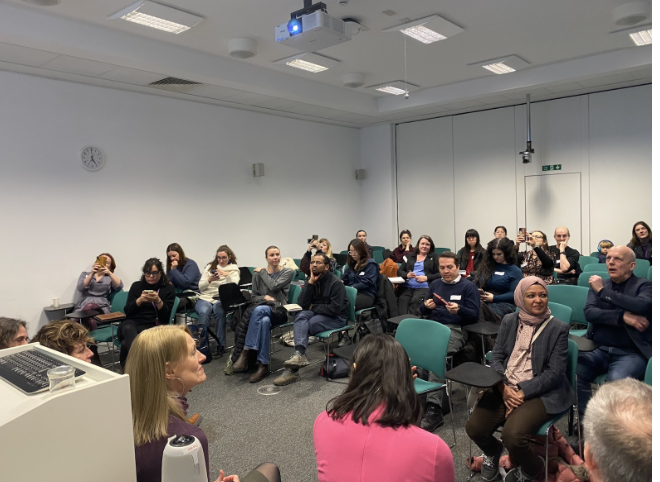The Early Career Researcher (ECR) Assembly launched on Friday 1 March at a well-attended event featuring ECRs and senior members of staff. Our guests included: Professor Anne Ferguson-Smith, the current Pro-Vice-Chancellor for Research; Professor Tim Harper, Head of the School of the Humanities and Social Sciences; Professor Emily So, Deputy Head of the School of Arts and Humanities; Liz Simmonds, Head of Research Culture, Professor Joanna Page, Director of CRASSH; Professor Susie Chan, Deputy Director of the Postdoc Academy; and Dr Nino Läubli, President of PdOC Society who had come to make their role visible and listen to the ECR community.
The shape of the evening was driven by conversation and exchange. After introductions and speeches from our guests, we discussed the results of the live poll on the views of our ECR attendees.
The first part of the evening showed how keen our guest speakers are to give resources and thinking space to the particular needs of the ECR community. Anne Ferguson-Smith made the point that researchers in arts, humanities, and social sciences have distinct hurdles and opportunities, but the larger cross-subject patterns in academia must not be ignored. The PVC was keen to recognise the differences between STEM and SHAPE (Social Sciences, Humanities and the Arts for People and the Economy) as well as the concerns shared among all early-career scholars. The way to find those differences and similarities is by listening and providing platforms, which is what the Assembly is here to provide.
The launch generated positive discussion about the value of ECRs; Tim Harper emphasised the cutting-edge and global qualities of ECRs’ research and teaching. The University is literally and metaphorically investing in our ECR community, and Liz Simmonds drew our attention to the funding available to improve our research culture, which isn’t just about research but creating a motivating, supportive, and healthy place to work. Part of the Assembly’s role is to consider where those funds would be best spent, and we look forward to developing ideas for that spending within the community.
As well as looking to the future, the Launch drew our attention to the support available to the ECR community now. Susie Chan spoke about the work of the Postdoc Academy in advocating for the group, and Nino Läubli made clear the resources of the Postdocs of Cambridge Society – do have a look at their web pages if you aren’t aware of them.
That we aren’t all aware of the resources available to us showed up clearly in the results of the poll. Funding application support featured as a source of concern, and so Josh and Georgina are planning to alert ECRs to where they can in fact find such support, for example, the AHSS Research Funding and Strategic Initiatives webpages, which is also home to our ECR Assembly pages. Discussion hovered over the limited number of votes for increased ECR well-being support. Do we think our well-being needs are being met, or do we want to look beyond our working environment to improve them? The vagueness of ‘wellbeing’ – from social groups to sports, to psychological support – also prompted us to rethink the language of that category.
These thoughts are only the beginning and we want you to take part in this ongoing discussion. Our Possibility from Precarity event on 4 June 2024 – co-convened by the CRASSH Research Seminars series and featuring speakers with real examples of success –will have a real impact on your career plans.
Join the ECR Assembly Teams Channel for updates and to hear about our upcoming drop-in lunch sessions. By engaging with your Assembly you’ll tell us how the University of Cambridge can become the best place possible for its Arts, Humanities, and Social Sciences ECR community.



